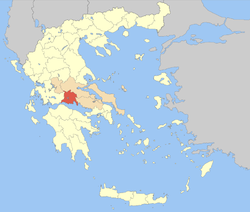Phocis
Regional unit in Greece From Wikipedia, the free encyclopedia
Phocis (/ˈfoʊsɪs/; Greek: Φωκίδα [foˈciða]; Ancient Greek: Φωκίς) is one of the regional units of Greece. It is part of the administrative region of Central Greece. It stretches from the western mountainsides of Parnassus on the east to the mountain range of Vardousia on the west, upon the Gulf of Corinth. It is named after the ancient region of Phocis, but the modern regional unit also includes parts of ancient Aetolia, Locris and Doris.
Phocis
Περιφερειακή ενότητα Φωκίδας | |
|---|---|
 Municipalities of Phocis | |
| Coordinates: 38°30′N 22°15′E | |
| Country | Greece |
| Administrative region | Central Greece |
| Seat | Amfissa |
| Area | |
• Total | 2,120 km2 (820 sq mi) |
| Population (2021)[1] | |
• Total | 36,199 |
| • Density | 17/km2 (44/sq mi) |
| Time zone | UTC+2 (EET) |
| • Summer (DST) | UTC+3 (EEST) |
| Postal code | 33x xx |
| Area code(s) | 226x0, 26340 |
| Vehicle registration | ΑΜ |
| Website | www |
Geography
Modern Phocis has an area of 2,120 km2 (820 sq mi), of which 560 km2 (220 sq mi) are forested, 36 km2 (14 sq mi) are plains, and the remainder is mountainous.[2] The massive ridge of Parnassus (2,459 m (8,068 ft), which traverses the heart of the country, divides it into two distinct portions. The neighbouring prefectures are Aetolia-Acarnania to the west, Phthiotis to the north and Boeotia to the east. It also shares a tiny border with Evrytania. Much of the south and east are deforested and rocky and mountainous while the valley runs from Itea up to Amfissa. Forests and green spaces are to the west, the central part and the north.
Its reservoir is the Mornos Dam on the Mornos river. It covers nearly 1 km to 3 km2. It was completed in the 1960s, and GR-48 was extended to pass through the dam.
The roads of Phocis are:
- Greek National Road 3, NE
- Greek National Road 27, Cen., N
- Greek National Road 48, SW, Cen., SE
- E65, SW, S, SE
Administration
Prefecture
The prefecture of Phocis was formed in 1947 from the previous Phthiotis and Phocis Prefecture. As a part of the 2011 Kallikratis government reform, a new regional unit Phocis was formed from the 1947 prefecture Phocis (Greek: Νομός Φωκίδας) without a change of territory.
Municipalities
In 2011 the regional unit Phocis was subdivided into 2 municipalities according to the table below.[3]
Former provinces
The pre-2011 municipalities had been organized into two provinces:
- Province of Dorida - Lidoriki
- Province of Parnassida - Amfissa
These were abolished. Provinces no longer hold any legal status in Greece.
Demographics
Summarize
Perspective
Modern Phocis was inhabited by several Greek tribes since antiquity, mainly by Phocians, Locrians and Dorians, which were intermingled and formed the present-day Phocian population, with a unique linguistic and cultural heritage, frequently mentioned as Roumeliotes.
Population statistics
With a population of 40,343 (2001), it is one of Greece's least populous regional units, and has a population density of 19 persons per square kilometre (49 persons/sq mi).[4] In the summer months, the population nearly doubles due to the influx of tourists.[2]
Most of the villages are in the south, the southeast and the east, especially in the areas between Amfissa and Itea. The north and the west are the least populated.
Notable people
- Alexander of Phocis
- Giannis Skarimpas (September 28, 1893 in Agia Efthymia Parnassidos – January 21, 1984)
- Nikolaos Makarezos (1919 – August 3, 2009)
- Eleni Karaindrou
Sporting teams
Here are the most popular sporting teams in the prefecture. All of the teams are under the Phocis Football Clubs Association in which it existed since 1985 after the separation and dissolution of the Phocis-Phtiotis Football Guild Union.
- Androutsos Gravia - Gravia
- Asteras Iteas - Itea
- Doxa Desfina - Desfina
- Isaia Desfina - Desfina
- Diagoras Polydrosos - Polydrosos
- Dorikos Nea Dorida - Nea Dorida
- Fokikos - Amfissa
- A.O. Malesina - Malesina
History
See also
Attribution
This article incorporates text from a publication now in the public domain: Chisholm, Hugh, ed. (1911). "Phocis". Encyclopædia Britannica. Vol. 21 (11th ed.). Cambridge University Press.
References
External links
Wikiwand - on
Seamless Wikipedia browsing. On steroids.


